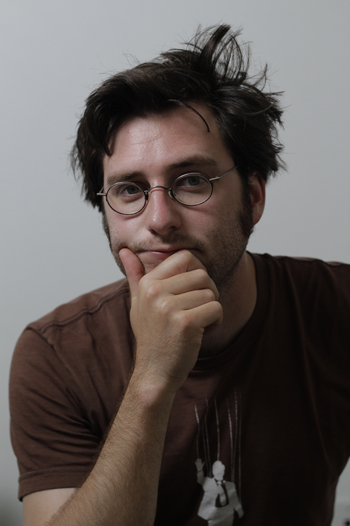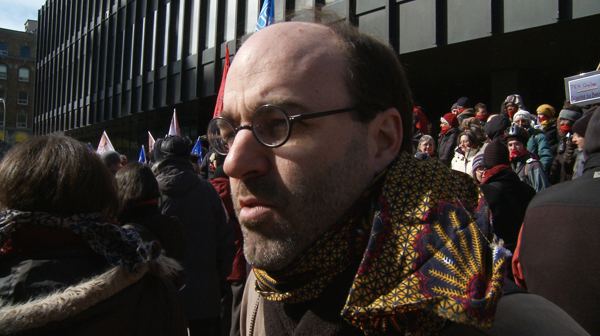"The problem of access to justice is still there and it's not being addressed" - Documentarian Julien Fréchette on 'Silence is Gold'
 Canadian documentarian Julien Fréchette presented his latest documentary feature Silence is Gold at the 58th Cork Film Festival. It is a gripping film about the author Alain Deneault, his co-writers and his publishers getting sued by giant Canadian mining companies over their book Noir Canada, that exposed some of the horrors of Canadian mining in African countries. Fréchette followed the author of the book and his troubles with the justice system for four years.
Canadian documentarian Julien Fréchette presented his latest documentary feature Silence is Gold at the 58th Cork Film Festival. It is a gripping film about the author Alain Deneault, his co-writers and his publishers getting sued by giant Canadian mining companies over their book Noir Canada, that exposed some of the horrors of Canadian mining in African countries. Fréchette followed the author of the book and his troubles with the justice system for four years.
MM - You mentioned in your introduction to the film before the screening that you originally intended to deal with a broader subject. When did you realise that you would want to focus on the lawsuit?
JF - It took me about a year and a half to figure out that the film should only have been about that case and the author of the book Alain Deneault. I read I don’t know how many versions of the script before realising that, but when I finally did, I realised that I should work on building a relationship with the author and that the case would be the main core of the film.
Was it hard to build that relationship?
Well, it’s always tricky. Especially in that situation where he was facing lawsuits and he had to be aware that the film would be released afterwards. But my aim wasn’t to make a trial of the trial. It was rather to show what it’s like to be sued by companies like Barrick Gold and Banro and to show the impact that it could have on the people.
 Did you ever find that dealing with this particular subject was risky, maybe even dangerous?
Did you ever find that dealing with this particular subject was risky, maybe even dangerous?
Yes, I had this feeling all over the process. I was walking on a thin line and knew I had to remain on that line in order to remain safe. In fact, the release of the film was the most intense moment because you don’t know what the reaction of the other party would be like. But I was quite happy with the reception and nothing bad happened – so I’m quite happy.
I first heard about Noir Canada through online freelance reporters and you yourself got a lot of the contribution from freelance journalists. Did you encounter a radical split in the media?
Certainly. What happened was that prior to 2008, when Noir Canada was launched, all those allegations were mainly running through those smaller networks and alternative media. It is only now that the situation has changed, and even large media are aware of the fact that there is something wrong with Canadian mining abroad. For example, they are carrying out an investigation on mining in Tanzania. The book and all the small networks surely contributed to it not being a secret but I don’t think things are changing. We have a very conservative government with tight links with the extractive industry and I don’t feel like anything is going to change. I mean, when you’re doing business in a place like Congo, you know something is going to happen and sometimes it may not even be your fault, but just by being there you end up being provocative.
 This story comes from Canada. What message would you like this documentary to portray to an international audience?
This story comes from Canada. What message would you like this documentary to portray to an international audience?
I guess every country has their own problems with the justice system. In Canada, it’s huge. There’s a split between the federal and provincial system. In Quebec we have tried to deal with this through passing some specific laws against abusive laws but the problem of access to justice is still there and nothing is being addressed. I don’t know about other countries, although in Canada there was a survey carried out that showed that eighty per cent of Canadians don’t have access to justice. If a case like this occurs, you are literally forced to defend yourself without money – and that’s a real problem. And although it presents itself as a public system, it works like a private system. It’s only if you have money that you can go on.
Are the SLAPP (Strategic Lawsuit against Public Participation) laws working?
They work in many cases. It’s not a perfect law, because proving to the judge that there is abuse may take years and takes money – and it’s not money that you see back.
Was it hard to get the film financed?
It surely was one of my most difficult film. I managed to shoot for a year or two with very little funding from out council. In the end, when we made the first cut, people finally realised that there would be a film and the National Film Board got involved and saved the film.
 You also mentioned that in Quebec the film did really well, but in the rest of the country not so well.
You also mentioned that in Quebec the film did really well, but in the rest of the country not so well.
I guess it’s a story that has lots of resonance in Quebec and some stories are more local. Maybe it’s just harder for other Canadians to relate to their stories because there is a different mentalities between the provinces. I tend to think that maybe Canadians get the natural feeling that if you were sued it’s because you did something wrong.
How do you choose your subjects as a filmmaker?
It’s either I choose a subject or the subject chooses me. I get interested in many subjects and sometimes an event occurs and provides a trigger point for my interest. Right now I’m just trying to have a lot of projects going on to try to make a living out of it, but it’s hard. I think the situation is hard for every documentarian all around the world.
 How do you see the future of documentaries?
How do you see the future of documentaries?
I don’t know what the future of the documentary will be like. There was a time when we had the backing of the National Film Board and our documentaries were recognised all around the world. Now, the situation has evolved in such a way that documentaries were tied to television, and television is now getting distant from documentaries. Or rather, they want to decide what documentaries to make, so it’s getting harder and harder for filmmakers to get their ideas financed. And plus, even though there is the whole web thing, that doesn’t give us a distribution market that is efficient – so it’s always a struggle to get your film seen. But, as I said, Silence is Gold did very well in Quebec. It moves people and generates very interesting discussions about justice and the case.
- Matt Micucci